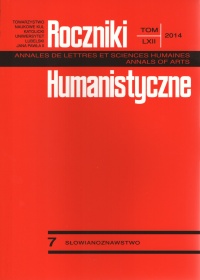Polish-ukrainian syntactic contrasts (on the example of complex sentences with subordinate attributive clauses with kiedy, gdy, gdzie, dokąd, skąd in polish and in translations into ukrainian)
Abstract
With this article the author presents a publication on syntax of the modern Polish and Ukrainian language. In particular, it is dedicated to the consideration and the analysis of compound sentences with subordinate attributive clauses with kiedy, gdy, gdzie, dokąd, skąd as connective words and their Ukrainian equivalents коли, де, куди, звідки).
On the basis of the original and translated (into Ukrainian) Polish texts the author compares common and distinctive characteristics of subordinate attributive clauses in both languages. The article establishes that in the process of translation the syntax nature of subordinate attributive clauses in the Polish and the Ukrainian languages does not always stay homogeneous, and this is often due to the translator’s choice, the use of a particular connective word as well as the grammar and stylistic norms of the language the text has been translated into.
Copyright (c) 2014 Roczniki Humanistyczne

This work is licensed under a Creative Commons Attribution-NonCommercial-NoDerivatives 4.0 International License.





